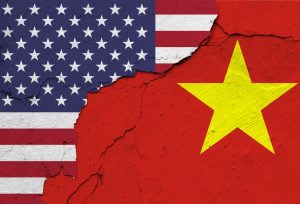To Lam, Vietnam’s president and the head of its ruling communist party, will today meet with U.S. President Joe Biden in New York. The meeting will take place on the sidelines of the United Nations General Assembly, the ostensible reason for Lam’s five-day working visit to the United States.
The White House confirmed the meeting in a statement on Sunday, saying that it “will be an important opportunity for the two leaders to talk about our shared interest in stability and prosperity in Southeast Asia.”
Last year, Washington and Hanoi announced a landmark upgrade in their diplomatic relationship, raising it to the level of a Comprehensive Strategic Partnership, the highest rank in Vietnam’s diplomatic hierarchy. The upgrade marked the culmination of two decades of strategic and economic convergence between the two former enemies, driven largely by shared consternation about China’s growing power and ambition.
Lam arrived in the U.S. on Saturday night, and will depart the country after his meeting with Biden. He will then embark on a two-day state visit to Cuba, before returning to Vietnam on Friday.
The Vietnamese party chief, who also serves as president, has had a busy agenda in New York. On Sunday, he addressed the U.N. Summit of the Future, becoming the first Communist Party of Vietnam chief to speak at the U.N. General Assembly. Curiously, he held a meeting that same day with members of the Communist Party of the USA and other “left-wing organizations.”
This seemed decidedly anachronistic next to perhaps the main purpose of his trip: economics. At a business forum in New York yesterday, Vietnamese and U.S. companies signed a number of MoUs, Reuters reported, citing a Vietnamese government statement. The MoUs include one on energy technology transfer signed by Vietnam’s state-oil firm PetroVietnam and Kellogg Brown & Root and LNG cooperation between PetroVietnam’s unit PTSC and Excelerate Energy. Vietnam’s Sovico Group also signed an MoU with the U.S. company Supermicro on AI and data center development.
Vietnamese state media reported separately that Vietnamese airline Vietjet and U.S.-based Honeywell Aerospace Technologies also signed a $1.1 billion cooperation agreement to provide avionics and aviation technical services for Vietjet’s fleet.
During the business forum, Lam spoke of Vietnam’s ambitions in semiconductors and AI, and said that U.S. businesses could play a key role in helping develop the industries. According to a Nikkei Asia report, he “urg[ed] Washington to scrap Nvidia export limits to Vietnam and recognize it as a market economy.” In August, the U.S. Department of Commerce rejected Vietnam’s bid to change its non-market economy status after a year-long review, a decision that was greeted with disappointment in Hanoi.
However, both sides have a strategic interest in overcoming this hurdle. Trade, investment, and cooperation in the high-tech sector, particularly in semiconductors, occupied a prominent position in the joint statement released by the U.S. and Vietnam after the establishment of their Comprehensive Strategic Partnership last year. In the statement, both sides “pledged to support the rapid development of Vietnam’s semiconductor ecosystem and to work together energetically to improve Vietnam’s position in the global semiconductor supply chain.”
This is perhaps the largest area of untapped potential in the U.S.-Vietnamese relationship, given the strategic emphasis that the Biden administration has placed on “friendshoring” vital high-technology supply chains, and the tight limits that Vietnam’s foreign policy doctrine places on security cooperation between the two nations.
During a speech a Columbia University on Monday, Lam said that Vietnam would continue with its “bamboo diplomacy” approach to foreign policy, which saw it host Biden, Chinese leader Xi Jinping, and Russian President Vladimir Putin in Hanoi last year – the only nation in the world to do so.
Vietnam “will continue to pursue its consistent foreign policy of independence, self-reliance, multilateralism, and diversification of external ties,” state media paraphrased him as saying. “The country aims to be a friend, a reliable partner, and an active and responsible member of the international community.”
Lam also said that Vietnam “will steadfastly uphold its ‘four no’s’ defence policy,” which rules out a formal military alliance with any country.
Before leaving the U.S., Lam is also scheduled to meet with executives from Google and Meta, the parent company of Facebook, Reuters reported.

































